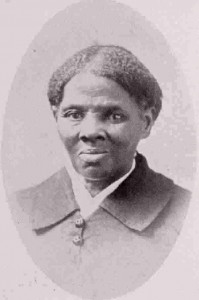Serendip is an independent site partnering with faculty at multiple colleges and universities around the world. Happy exploring!
2014 Tri-Co Environmental Studies Workshop: "Muddying the Waters"

"Muddy-ing the Waters": Doing Justice To Race, Class,
Gender and Environment (Jody Cohen and Anne Dalke)
Session I @ the 2014 Tri-Co Environmental Studies Workshop

Jody: What do you see here?
What do you notice?
Describe what you see…
Who is this?
What do you know about her?
[write these words on the board...]
Anne: One characteristic we haven’t heard is “environmentalist.” We first learned to think of Harriet Tubman as an environmentalist this March, when Dorceta Taylor, a professor of environmental sociology @ U Michigan (and the mother of two Bryn Mawr first-year students), came to speak to our cluster of courses on Eco-Literacy. Taylor described Tubman as
“a leading environmental justice activist …
[who] began learning about the environment while toiling in the fields
* she learned to read the sky to predict the weather…
* to imitate bird calls and use them to communicate with others….
* to read the river currents [and the]
* moss—which grows heavier on the northern side of trees;
* She also learned about the medicinal use of plants,
* how to estimate the time of night…
Before launching a raid, Tubman…lay alone in the forest all night….
thrilled with such emotion that her fear vanished…. “
In other words (and in the words of the great Brazilian educator Paulo Friere), Tubman knew how to “read the world”—and, more, to use those readings to help find justice for the people who were enslaved in that world (in Friere’s words, this involves “critical perception, interpretation, and re-writing what is read”).
I have been teaching American studies for 4 decades; I have long known Harriet Tubman’s story. I have just recently begun to do the work of environmental studies, and learning to think about Harriet Tubman as an “environmental justice activist” required a real re-orientation for me, a re-thinking of “what I thought I knew.”
It made me wonder why we haven’t thought of Harriet Tubman as an environmentalist—and how we might come to “re-read” her that way. How might this re-reading revise our & our students’ understanding of what constitutes an “environmental issue”?
Harriet Tubman "noodle"....
Jody: We are both long-term teachers in multiple arenas of identity politics, well accustomed to shepherding classes through the tangle of difference that is race/class/gender/religion/ability. As newcomers to environmental studies, we are still learning about how the field constructs itself, and figuring out how to contribute our own particular version of humanistic social science/social science-y humanism to this structure. This fall we will be mixing identity politics with environmental concerns in a linked pair of new first semester writing courses devoted to “doing justice” to “race, class, gender and environment.”
Bringing freshwomen into these issues in their
first semester at college, we will ask,
* where are they entering?
* how are they ‘reading their worlds’?
* how can we help them expand and deepen
their readings of worlds-and-words?
We will ‘muddy the waters’ of what they think they know, and support their investigation of what they
– and we – don’t know we don’t know; we will find ‘pre-disciplinary’ ways of thinking about and acting
on the big questions of our time-and-place.
A second semester freshwomen in our Eco-literacy 360 wrote about this kind of thinking:
Just last week I was at a school in Camden, NJ with fifth graders… My fellow Bryn Mawr classmates and I came up with an acting activity whose goal was to have two groups of students try to come into conversation about sharing land, being ecologically friendly, and working together as strangers. The point wasn't for them to walk away from the activity being totally enlightened about how humanity has successfully or disastrously conquered the natural planet, but rather, for them to practice and experience more global&local, historical¤t issues about how people interact….
How are we taking this (eco-literacy) education with us forward? Not in 10 years, not when we have children of our own or grandchildren but tomorrow. Next week. Right now. Even yesterday. I don't feel comfortable shoving it down other (people's) throats and saying that because I learned this…but we can't keep it to ourselves.
Not a bad place to end a first semester of ecological literacy….!

